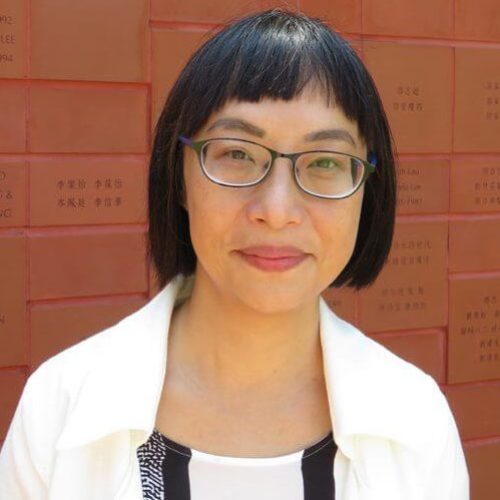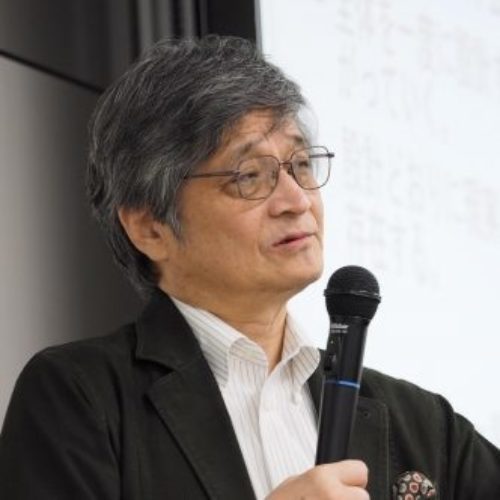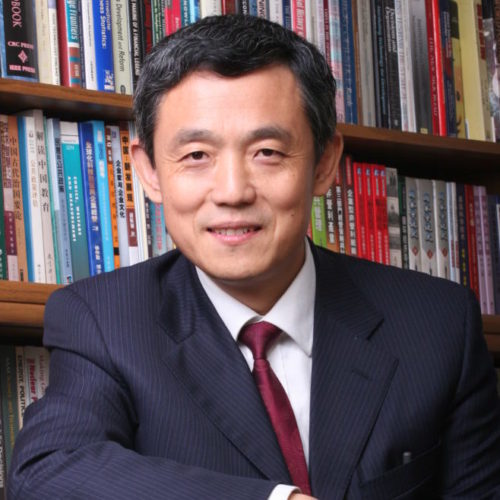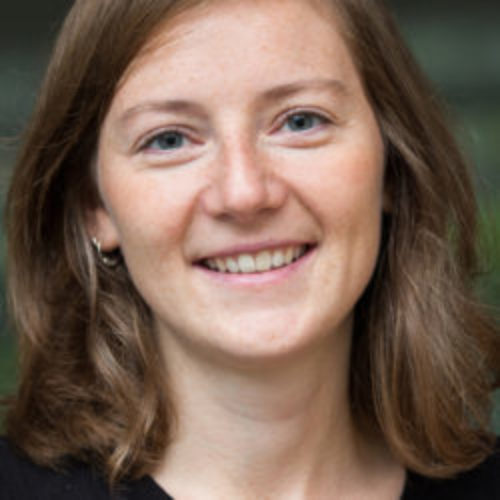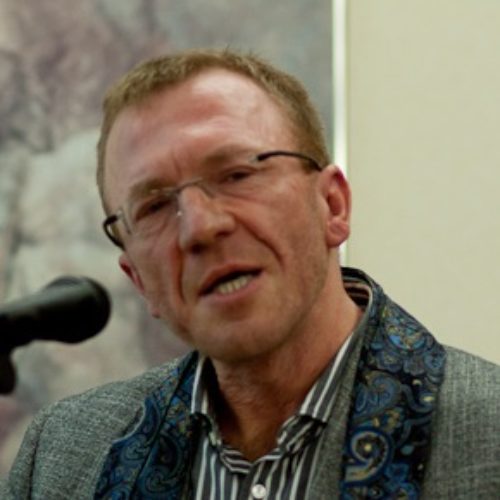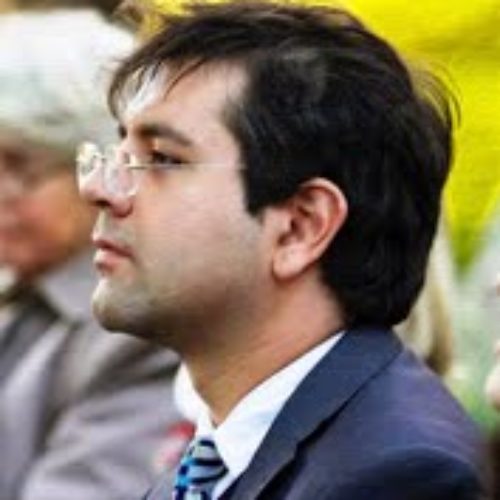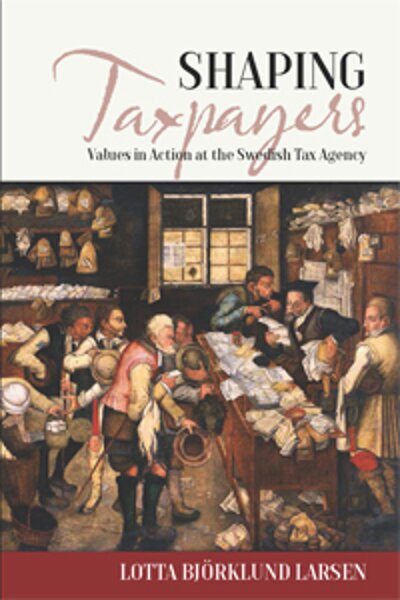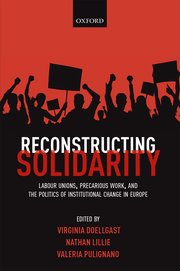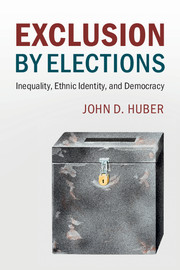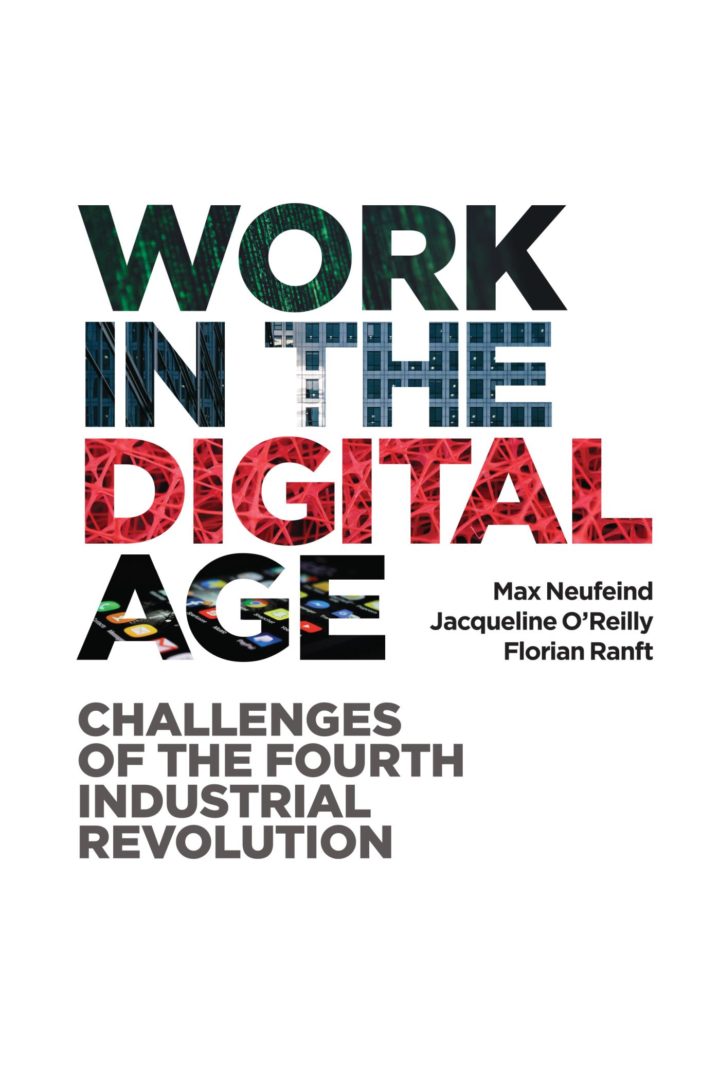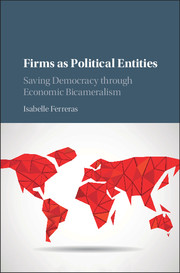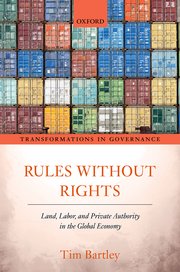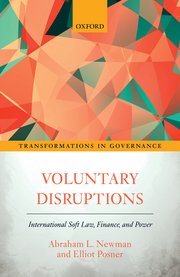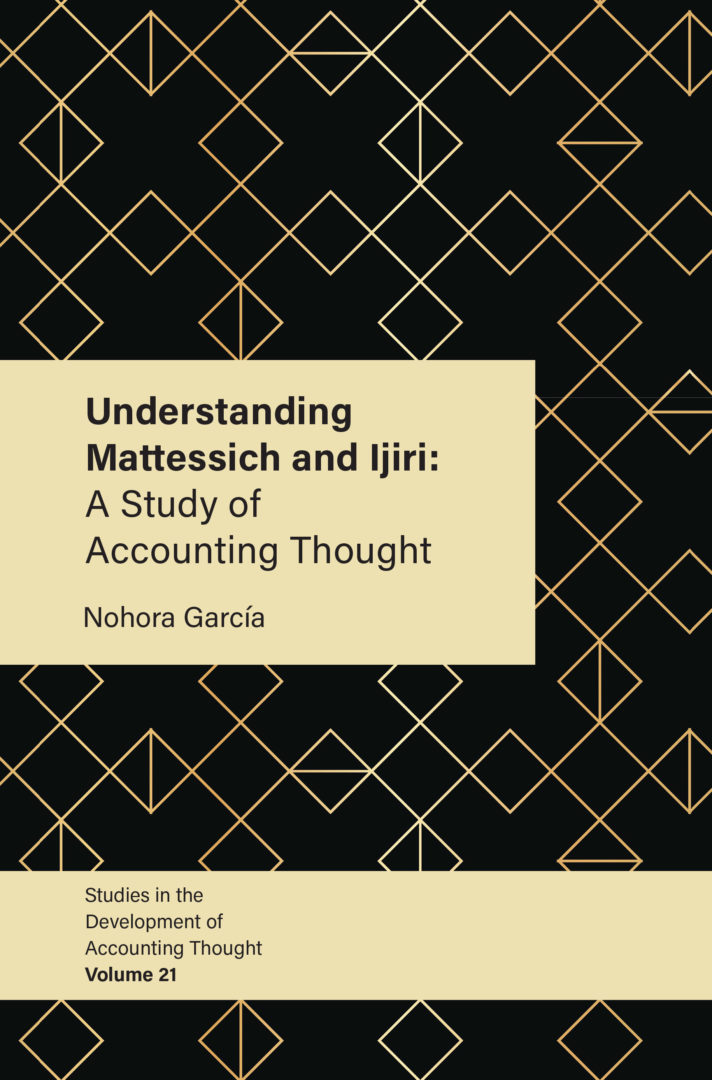Mini-Conference Themes
Each mini-conference will consist of 3 to 6 panels, which will be featured as a separate stream in the program. Each panel will have a discussant, meaning that selected participants must submit a completed paper in advance, by 1 May 2018. Submissions for panels will be open to all scholars on the basis of an extended abstract. If a paper proposal cannot be accommodated within a mini-conference, organizers will forward it to the most appropriate research network as a regular submission.
Comparative Political Economy and the Environment
detailed info Matthew Allen
Matthew Allen

Matthew Allen is Professor of International Business at Manchester Metropolitan University Business School. His research compares and analyses business and employment systems and their effects on innovation, technology and work designs. His work has been published in leading comparative and international business journals, such as the British Journal of Management, Socio-Economic Review and the International Journal of Human Resource Management. He is on the editorial board of the International Journal of Human Resource Management. He has gained funding for his research from the German Academic Exchange Service, the Fritz Thyssen Foundation and the Engineering and Physical Sciences Research Council. In 2020, he gained funding from the Department for Business, Energy & Industrial Strategy for a prestigious Management Knowledge Transfer Partnership.
Before joining Manchester Metropolitan University Business School, he worked at Essex Business School and Alliance Manchester Business School, where he directed MSc programmes, including the FT-ranked MSc in Business Analysis and Strategic Management. He was the DBA Director between 2015 and 2019, successfully managing the programme and its partnership with the prestigious Shanghai Jiao Tong University, China. The joint DBA programme with SJTU was the only DBA programme approved by the Ministry of Education, China. During his Directorship, completion rates, publications from DBA research and the number of graduates going on to university careers increased.
Matt regularly attends, and presents papers at, the annual conferences of the Society for the Advancement of Socio-Economics and the Academy of International Business (UK and Ireland Chapter). He is one of the co-ordinators of Network F within SASE on Knowledge, Technology and Innovation. Between 2012 and 2015, he was the Communications Officer for the AIB (UK and Ireland Chapter). A paper he co-authored with Florian Becker-Ritterspach and Knut Lange was nominated for the Florida International University/Academy of International Business Best Theory Paper Award in 2020.
 Jared Finnegan
Jared Finnegan

Jared is a PhD Candidate in the Department of Government at LSE. He is also affiliated with the Grantham Research Institute on Climate Change and the Environment. His research examines variation in climate change policy adoption and stringency across the advanced democracies, focusing primarily on formal political institutions and electoral incentives.
 Geoffrey Wood
Geoffrey Wood

Professor Geoffrey Wood is Dean and Professor of International Business, at Essex Business School. Previously he was Professor of International Business at Warwick Business School, UK. He has authored/co-authored/edited sixteen books, and over one hundred and sixty articles in peer-reviewed journals. Previously he was Professor of International Business at Warwick Business School, UK. He holds honorary positions at Griffith and Monash University in Australia, and Witwatersrand and Nelson Mandela Universities in South Africa. Geoff’s research interests centre on the relationship between institutional setting, corporate governance, firm finance, and firm level work and employment relations.
Geoffrey Wood is Editor in Chief of the British Journal of Management, the Official Journal of the British Academy of Management (BAM). He also serves on the BAM Council. He is also Co-Editor of the Annals of Corporate Governance.
He is also editor of the Chartered ABS Journal Ranking list.
He has had numerous research grants, including funding councils (e.g. ESRC), government departments (e.g. US Department of Labour; UK Department of Works and Pensions), charities (e.g. Nuffield Foundation), the labour movement (e.g. the ITF) and the European Union.
Climate change and environmental sustainability are significant policy problems facing advanced capitalist democracies, yet comparative political economy has contributed little to research in this area. Organised around two broad themes, this mini-conference brings together scholars working at the intersection of comparative political economy and the environment to address key questions on business and energy and the comparative political economy of climate change policy, and to develop a research network for future collaboration. We will prioritise contributions with sophisticated, comparative research designs that include innovative, well-developed and testable theory, grounded in the comparative political economy literature. We welcome both pure theoretical and rigorous empirical papers.
Business and energy
We are now in a long energy transition: the proportion of hydrocarbons as a part of the global energy mix is declining. However, fossil fuels still account for a large share of electricity generation. A new body of work links long energy transitions to national institutions. Two major journals, Journal of International Business Studies and British Journal of Management, are running unprecedented parallel special issues on this question.
Building on this work, we call for submissions to address questions related to the following issues:
- Socio-economic institutions and the switch to renewable resources: how have publicly funded innovation systems influenced the risks associated with developing and deploying fossil-fuel and renewable-energy technologies in different locations?
- The consequences of the use or ‘non-use’ of renewable energy for different socio-economic groups: Does the switch to renewable energy affect the number of ‘decent’ jobs within countries? Does shale gas influence which sectors and firms investors back?
- Developments in energy supplies and the reinforcement of, or reduction in, institutional differences between countries: Does the greater use of shale gas reinforce the role of highly mobile investors and their prioritization of short-term financial rewards? Does switching to renewables complement the role of patient capital?
Comparative political economy of climate change policy
The adoption and stringency of climate change mitigation policies varies considerably across the advanced democracies. What explains this cross-national variation? Why do some countries do much to address climate change while others do little? Surprisingly, we know relatively little about the answers to these questions. We would, therefore, welcome contributions that seek to address the following themes:
- Political and economic institutions. What role do formal institutions play in influencing climate policy adoption and stringency – electoral rules, legislative rules, federalism, corporatism, varieties of capitalism, corporate governance, etc?
- Organised interests. What role do business and labour organisations play? NGOs?
- Politics of the long-term. Which factors influence politicians’ willingness to invest in long-term policies that incur short-term costs on their constituents? Which factors lengthen business leaders’ time horizons?
- Partisanship and the climate. Do parties matter in regards to climate policy?
- Electoral incentives. What effect do electoral competition, electoral accountability and electoral cycles have on climate policy?
- Political economy of policy instrument choice. Why do governments choose one policy instrument over another?
- Public opinion: Does public opinion matter for climate policy? Under what conditions?
Global Finance: Hidden and Public Dimensions
detailed info Karin Knorr Cetina
Karin Knorr Cetina

Karin Knorr Cetina is Distinguished Service Professor and Chair of the Department of Sociology, University of Chicago, Principal Investigator of a comparative project on scopic media at the University of Konstanz, Germany, and an affiliated member of the Institute for World Society Studies, University of Bielefeld, Germany. She also holds a honorary doctorate of the University of Luzern, Switzerland, and was previously President of the Society for Social Studies of Science and Section and Chair of the Theory Section of the ASA. Dr. Knorr Cetinapublished extensively in the area of economic sociology and finance, and in the area of science and technology studies. Her writings include “Global Microstructures: The Virtual Societies of Financial Markets” (with Urs Bruegger, American Journal of Sociology, 2002 Winner of the Theory Prize of the Theory Section of the American Sociological Association) the Oxford Handbook of the Sociology of Finance (edited with A. Preda, 2012) and the book Epistemic Cultures: How the Sciences Make Knowledge (Harvard UP 2003, winner of the Robert K. Merton price and the Ludwick Fleck Price of the ASA). She just finished a book on the currency market (Synthetic Markets: The Currency Market as a Media-Institutional Form, forthcoming) and is currently conducting research on agentic media in finance and other areas.
 Alex Preda
Alex Preda

Alex Preda is a sociologist at King’s College London. He holds a PhD in sociology from the University of Bielefeld. For more than seventeen years, his research has focused on financial markets in relationship to technology. He is the author, of, among others, Framing Finance. The Boundaries of Markets and Modern Capitalism and Noise. Living and Trading in Electronic Finance, both published by The University of Chicago Press. His current research project is an ethnography of the “facework” deployed by financial institutions in collaboration with the media industries. Together with his PhD students, he also investigates the impact of real time communication on the dynamics of trading in electronic markets.
We invite contributions that investigate two fundamental dynamics of global finance and markets, and the ways in which these dynamics intersect: the internal, markets- and institution-specific processes and arrangements which support financial transactions, on the one hand, and the “facework” deployed by financial institutions towards external audiences, on the other hand. While more recent approaches, and especially those conducted in the tradition of science and technology studies, have emphasized the role of knowledge, information, and technology in the internal dynamics of markets, the extent to which information and knowledge play a significant role in the public face of financial markets and institutions is much less clear. At the same time, both dimensions (hidden and public) can be seen as arenas of struggles and contestations, as exemplified, for instance, in the public debates around the value of finance. The extent to which these dimensions influence each other (or not) deserves increased attention.
We particularly welcome contributions that explore the following issues:
The impact of information technologies on financial organizations and markets, and the ways in which these technologies alter the dynamic and scope of financial transactions. Of interest are, among others, contributions investigating dedicated financial infrastructures, the increased use of algorithms and AI, markets in digital currencies, the impact of distributed ledgers, or the organizational challenges brought by FinTech.
The practices and structures of trading, both at the institutional and at the retail level. Of interest are, among others, contributions investigating the microdynamics of trading in relationship to technology, or the constitution and types of trading agency (including its constraints and limitations). What is the interplay between informational and institutional (infra)structures (including here regulation), on the one hand, and transactional practices, on the other hand?
The work deployed by financial institutions and markets that targets external audiences, and the organizational arrangements supporting such “facework.” Of interest here are, among others, contributions investigating the presence of finance beyond the boundaries of trading floors and boardroom, in areas such as popular culture, the media, educational, or other professional institutions, to name but a few. Welcome as well are contributions investigating the constitution and responses of financial publics; the role played by technology, and especially by social media technologies in the interactions between financial institutions and external publics; the consequentiality of this “facework” for the inner dynamics of financial organizations and transactions.
The mini-conference welcomes theoretical, as well as empirical contributions and diverse methodological approaches.
Inclusive Growth and Social Investment: What Prospects For Equality, Democracy and Justice?
detailed info Jean-Michel Bonvin
Jean-Michel Bonvin
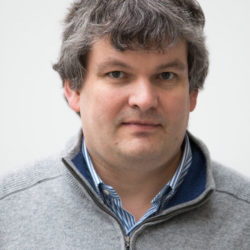
Jean-Michel Bonvin is Professor of Socioeconomics and Sociology at the University of Geneva (Switzerland). His main fields of expertise include social and labour market policies, with a special focus on the issue of social investment, and theories of justice with a wide expertise of Amartya Sen’s capability approach. He has extensively published on these issues in leading peer-reviewed journals. He is presently project coordinator in the NCCR LIVES project “Overcoming Vulnerability: Life Course Perspectives” funded by the Swiss National Fund and principal investigator and project leader in the Re-INVEST European project “Rebuilding an Inclusive, Value-based Europe of Solidarity and Trust Through Social Investments” (H2020). He was also main investigator and project leader of numerous other collaborative EU research projects, such as SocIEtY “Social Innovation – Empowering the young for the common good” (FP7) or CAPRIGHT “Resources, rights and capabilities: in search of social foundations for Europe” (FP6).
 Francesco Laruffa
Francesco Laruffa

Francesco Laruffa is since August 2016 Research Fellow at the University of Geneva, where he works on the EU-funded RE-InVEST project. In Geneva he is also member of the research network LIVES and of the Center for the study of capabilities in social and health services (CESCAP). Before coming to Geneva he was from 2013 to 2016 Research Fellow at the Humboldt University in Berlin, where he worked on the project Saisir l’Europe. He has also been visiting scholar at the International Research Centre for Ethical and Social Issues (IFZ) in Salzburg. His research interests include the interplay between theories of social justice and welfare reform, the relationships between economic inequality and democracy, theories of democratic citizenship (especially neo-republicanism, deliberative democracy and radical democracy), neo-liberalism, and critical theory. Recent publications include: “Towards a Critical Sociology of Democracy: The Potential of the Capability Approach”, Critical Sociology (with Jean-Michel Bonvin and Emilie Rosenstein) – available in open access – and “Work and Inequality Revisited: A Global Socio-Historical Perspective and its Political Implications”, Sociologia del Lavoro (with Hannah Schilling).
 Kang-Kook Lee
Kang-Kook Lee

Kang-Kook Lee is a Professor of College of Economics at Ritsumeikan University. His research interests include inequality and growth, financial globalization and the East Asian economy. He received Ph.D. in economics from University of Massachusetts and published many several books and many papers in academic journals such as Cambridge Journal of Economics and Global Economic Review. He was a visiting scholar at Columbia University from 2009 to 2010. He is an editor of The Japanese Political Economy and a columnist at Hankyoreh, a Korean Newspaper.
 Keun Lee
Keun Lee

Keun Lee is a Professor of Economics at the Seoul National University, and the founding director of the Center for Economic Catch-up. He has been awarded the 2014 Schumpeter Prize for his monograph on Schumpeterian Analysis of Economic Catch-up: Knowledge, Path-creation and the Middle Income Trap (2013 Cambridge Univ. Press). He is now the President of the International Schumpeter Society, a member of the Committee for Development Policy of UN, an editor of Research Policy, a council member of the World Economic Forum, and a member of the governing board of Globelics. He obtained Ph.D. in economics from the University of California, Berkeley, and had working experience at the World Bank, University of Aberdeen, and the East West Center, Hawaii. One of his most cited articles is a paper on Korea’s Technological Catch-up published in Research Policy, with 955 or so citations (Google Scholar). His H-index is now 33, with 80 papers with more than 10 citations.
 Hyeog Ug Kwon
Hyeog Ug Kwon

Hyeog Ug Kwon is a professor at the College of Economics, Nihon University and a faculty fellow at the Research Institute of Economy, Trade and Industry (RIETI). Prior to his current position, he was an associate professor (2008-2013) and assistant professor (2006-2008) at Nihon University and a lecturer at the Institute of Economic Research, Hitotsubashi University (2005-2006). He received his Ph.D. in Economics from Hitotsubashi University in 2004.
His research interests focus on productivity analysis and industrial organization. His research has been published in various academic journals including Review of Economic Dynamics, Journal of Macroeconomics, Journal of Industrial Economics and Research Policy. He is an editor of Seoul Journal of Economics and a leader of several projects in RIETI’s Raising Industrial and Firm Productivity program.
The last three decades have been characterized by rising economic inequalities (in terms of income, wealth and capital vs. labor share) as well as by declining trust in democratic institutions. These processes have been driven by key factors, such as changes in power relations in favor of the wealthy, extended financialization and de-regulated globalization – all features of the neo-liberal ideology. However, since the financial crisis started in 2008, the hegemony of neo-liberalism has begun to be under pressure. Yet, in this process of global reordering, there is no guarantee that the new approaches, though claiming to overcome market fundamentalism and austerity, involve more emancipatory social contexts. Notions such as “inclusive growth” and “social investment” are endorsed by both leading scholars and international organizations (e.g. the OECD, the World Bank and the EU). They have already inspired reforms around the world, including in Europe (e.g. Social Investment Package of the European Commission), in East Asia (especially in Korea and Japan where the “income-led growth strategy” and so-called “Abenomics” are increasingly influential approaches), in Latin America (where “conditional cash transfer programs” have been largely implemented) as well as in Australia and New Zealand. These emerging approaches may well involve a “paradigm shift” away from neo-liberalism but it remains unclear what they are able to deliver in terms of equality, democracy and justice. This new context opens up important normative and empirical challenges. The mini-conference will tackle these challenges in three successive panels:
- Inclusive growth, social investment and neo-liberalism: theoretical and normative issues
- Do the inclusive growth and social investment approaches really break with neo-liberalism? Or do they remain linked with an economic rationale, which impedes them to effectively promote equality, democracy and justice?
- To what extent are these approaches able to integrate the dimensions of “global justice” and “global citizenship”?
- To what extent can they include an eco-social agenda, capable of integrating (intergenerational) social justice, democracy and environmental sustainability?
- The impact of neo-liberalism, inclusive growth and social investment on economic inequality
- What role is played by financialization and globalization in the process of increasing inequalities? What are the main socio-economic results of neoliberalism?
- What are the consequences of social investment and/or inclusive growth policies on economic inequalities (taking into account class, gender and racial inequalities)? Do they reduce or reinforce existing inequalities?
- Are there significant differences across and within world regions?
- The impact of neo-liberalism, inclusive growth and social investment on political inequality
- What is the impact of neoliberalism on political equality and the health of democracy?
- Do social investment and/or inclusive growth policies actually reinforce democracy? Or do they give more power to technocrats and experts?
- Are there significant differences across and within world regions in terms of the impact of these approaches on political participation and democratic involvement?
We encourage submissions that address these and related themes and develop convincing arguments grounded in conceptual or empirical (qualitative and quantitative) studies.
Marketization and the Digital Economy
detailed info Thomas Beauvisage
Thomas Beauvisage

Thomas Beauvisage is a sociologist and web scientist at the Social Sciences Department of Orange Labs (Sense). His early works and PhD focused on web usage mining and browsing behavior characterization. Today, his activities involve both internet research and market studies; his current research topics cover online participatory market devices, advertising and e-reputation, and uses of online media. He is also involved in methodological investigations on the use of quantitative behavioral material for social science.
 Jean-Samuel Beuscart
Jean-Samuel Beuscart

Jean-Samuel Beuscart is Professor of Sociology at Sciences Po Medialab in Paris. His research focuses on the digitization of markets and consumption. His current work focuses on the digitization of music consumption, the digital guidance of sustainable behaviours, and the ecological footprint of digital technologies.
 Dave Elder-Vass
Dave Elder-Vass

Dave Elder-Vass teaches sociology and digital economies at Loughborough University in the UK. Before returning to academic life he was a senior IT technology manager in the private sector. He writes on social ontology and more recently on economic sociology, particularly the gift economy and the digital economy. His publications include The Causal Power of Social Structures (2010), The Reality of Social Construction (2012), and Profit and Gift in the Digital Economy (2016), all with Cambridge University Press.
 Timur Ergen
Timur Ergen

Timur Ergen is a senior researcher at the Max Planck Institute for the Study of Societies and an interim professor of sociology at the University of Oldenburg. Timur co-organizes the SASE Research Network Digital Economy and has been a member of SASE’s Executive Council since 2020. His research investigates competition, energy transitions, industrial and technology policy, and the postindustrial economy. His previous work has appeared in Competition and Change, Energy Research and Social Science, the Review of International Political Economy, and the Socio-economic Review.
 Anne Jourdain
Anne Jourdain

Anne Jourdain is associate professor at the University Paris-Dauphine and researcher at IRISSO (Interdisciplinary Research Institute in Social Sciences). She co-chairs the “Economic sociology” section of the French Sociological Association (AFS). Her research fields are economic sociology and art sociology, with a specific focus on arts and crafts. She recently published “Analysing the Symbolic Economy with Pierre Bourdieu: The World of Crafts” (Forum for Social Economics, 2015) and Du Coeur à l’ouvrage. Les artisans d’art en France (Belin, Paris, 2014).
 Sidonie Naulin
Sidonie Naulin

Sidonie Naulin is associate professor in sociology at Sciences Po Grenoble and research fellow at Pacte (Public policies, political Action, Territories). Her research interest lies at the intersection of labor, professions, media and food studies. She recently co-edited The Social Meaning of Extra Money. Capitalism and the Commodification of Domestic and Leisure Activities with A. Jourdain (Palgrave Macmillan, 2019).
Global reordering in the economy is occurring at many levels – between geographical regions, within geographical regions, between economic sectors, between different players in the same sector, and between market and non-market models of economic provisioning. The digital economy is at the forefront of these processes of reordering. For this miniconference we invite papers on all aspects of the socio-economic changes related to marketization and the contemporary digital economy, in all regions and sectors. Topics may include, for example:
Collaborative forms of digital economy
Digital technology has created new spaces for non-market and non-profit forms of economy, whether we call them collaborative, sharing, gift, or collective economies – from Wikipedia to Couchsurfing, from the open source software communities to Freecycle. How are these faring in their continuing competition with market forms? How do they combine or collide with more commercial forms? Are they able to deliver more equal and democratic forms of work and consumption?
Marketization processes
On the other hand, many practices previously considered as recreational or domestic are increasingly becoming marketized. Web platforms such as Airbnb.com, Craigslist.org, Etsy.com or Vizeat.com, encourage ordinary people to commodify their personal possessions as well as their common domestic or leisure practices. Human bodies and personal data are becoming commodified. Ordinary people are encouraged to turn themselves into entrepreneurs, changing forms of work-life articulation and generating altered social recognition. What are the causes and effects of these extensions of the market? How do market and domestic orders of worth combine? What are the consequences for the regulation of professions and the new challengers?
The platform economy
Platform sites like Amazon and Alibaba are well established, but the platform model is now breaking into vast new areas, most notoriously through taxi services like Uber and Didi. How do these new intermediaries benefit or harm competitors, states, workers and consumers? How can, and how should, they be regulated? Can those harmed by them find new ways to organize in response? Do the participants in the platform economy bring new values or moral economies to the markets that they impact? How do algorithm-based orderings, filterings and decisions fit with online platforms and their participants?
Digital market processes
The new economic sociology was largely defined by its account of embeddedness. Are digital commodity transactions and business models embedded in the social in different ways? How have the means of qualifying and valuing commodities changed, and who do these changes favour? Does digitalization favour specific forms of industrial organization? How does the massive collection of data on consumers affect the balance of power in and across markets and what risks does this generate? To what extent does digital automation (through algorithms, “artificial intelligence”) redistribute agencies and the balance of power within markets? What are the prospects for a digital transformation of the monetary form of commodity transactions?
Systemic consequences
What is the overall effect of these changes on macrosocial variables such as inequality, governance capacities, systemic risk, environmental change, and political engagement with economic issues? Does digital technology offer a prospect of greater economic and financial inclusion or is it systematically stacked against the poorest and most marginalized?
Politics of the Future, Policies in the Present
detailed info Vincent Cardon
Vincent Cardon

Vincent Cardon is an assistant professor at the University of Picardie Jules Verne, and a member of the Centre Universitaire de Recherches sur l’Action publique et le Politique, Epistémologie et Sciences Sociales and of the Institute for Research and Innovation in Society. He holds a PhD in sociology from the Ecole des Hautes Etudes en Sciences Sociales and has published articles about the analysis of insecure labour markets, the social organisation of production in the movie industries, the effects of the Internet on evaluation (online consumer reviews in the hospitality industry), the risk assessment of unprecedented risks (agro-terrorism) and of pesticides’ health effects. His current research interests span the social construction of markets, valuation processes and quantification. He recently opened a field work on global food security issues, with a focus on the scenario analysis tools designed by agro-economists to model the long term future of agriculture.
 Antoine Bernard de Raymond
Antoine Bernard de Raymond

Antoine Bernard de Raymond is a sociologist at the National Institute for Agronomic Research (INRA), in Paris, France. He is specialized in the sociology of markets and the sociology of agriculture, and studies the transformations of food systems. He has published or edited books about the market for fruit and vegetables in France (En toute saison. Le marché des fruits et légumes en France), industrial farming, and economic sociology. He currently works on food security and the globalization of public issues.
 Olivier Pilmis
Olivier Pilmis

Olivier Pilmis is a Research Fellow in Sociology at the French National Center for Scientific Research (CNRS) and a member of the Centre de Sociologie des Organisations (Sciences Po – CNRS) in Paris. He received his PhD in Sociology from the Ecole des Hautes Etudes en Sciences Sociales (EHESS). His research applies economic sociology, organizational sociology and sociological theory to the study of macroeconomic forecasting. Pilmis’s work focuses on the emergence of beliefs, the production of legitimate discourses about the future, and the social structure of the market for forecasting.
Current Research Project : http://www.sciencespo.fr/liepp/en/content/informer-pour-gouverner-les-dynamiques-institutionnelles-des-mondes-de-la-gouvernance-macroe
In recent years, socio-economists have studied social actors’ ability to elaborate representations of the future convincing enough to enable present actions when uncertainty prevails. The aim of this mini-conference is to bring together researchers examining how the future is taken into account in economic activities and regulation. Contributions addressing the following thematic strands are particularly welcome:
The technologies of future-related regulation. Present anticipations of the future involve a set of tools and calculative technologies. These techniques not only differ in the way they process “data” but also in the construction of the economic reality they engage. They also depend on the category of actors (institutions, NGOs, firms, individuals, pressure groups etc.) who produces and/or makes use of them. The development of foreknowledge for regulation emphasizes connections between socio-economics and science and technology studies, and leads to an interrogation on the social conditions under which expertise is regarded as reliable.
From planning to preparedness: knowledge of the future and governmentality. Anticipating the future is in tight relation with forms of government. For instance, while central planning drew on the assumption that the future was predictable, some new forms of regulation are based on the hypothesis of the occurrence of unlikely events (e.g. worst-case scenario). This shift questions the appropriate form of economic regulation and projection, conceivably leading to technological or cognitive disruptions.
The temporal orientation of regulation. The regulation of economies requires dealing with the future in the present. Future-guessing widely relies on present knowledge. Socio-technical devices cannot be understood without reference to the specific objective of economic regulation and, to its temporal order (e.g., shorter- or longer-run, trend/pathways or crisis/disruption). The way future economic orientations are designed affects the implementation of regulations in the present. Thus, investigating the relationship between projections about the future and action in the present also requires studying how these projections and calculations are translated into actual and present promises, decisions and guidelines.
Professional Networks and Expert Numbers in Economic Governance
detailed info Daniel Mügge
Daniel Mügge

Daniel Mügge is Professor of Political Arithmetic at the University of Amsterdam. His research examines the political underbelly of macroeconomic statistics, and he currently leads two large research projects on the topic. At the University of Amsterdam, he leads the FickleFormulas research team that investigates the political economy of macroeconomic indicators and the political origins of the formulas through which we calculate them—basically asking why we measure our economies the way we do. Daniel is currently writing a book on the topic that is under contract at Harvard University Press. This research is funded by the ERC and NWO, the Dutch Organization for Scientific Research.
Daniel Mügge also leads the workpackage “Banking Crisis and Financial Sustainability” in the Horizon2020 project ENLIGHTEN: European Legitimacy in Governing Through Hard Times. In the past, he has published widely on the politics of financial regulation and accounting standards. He spent the first half of 2012 as a visiting scholar at the Center for European Studies at Harvard University; he returned to spend the whole academic year 2014/15 there, as well.
 Leonard Seabrooke
Leonard Seabrooke

D: Professions and Professionals in a Globalizing World
Leonard Seabrooke is Professor of International Political Economy and Economic Sociology in the Department of Organization at the Copenhagen Business School, and Research Professor at the Norwegian Institute of International Affairs. Len’s research focuses mainly on transnational professionals, international organizations, activist movements, and consultancy communities on a range of politico-economic issues. Seabrooke’s work has featured in American Sociological Review, Annual Review of Sociology, Socio-Economic Review, Review of International Political Economy, and many other journals. His most recent book is Global Wealth Chains (co-edited with Duncan Wigan, Oxford University Press 2022).
Why are economic policies what they are? Scholars in sociology, political science and beyond have demonstrated that ideas and beliefs held by policymakers are both constructed and also crucial to their decisions. Yet, such ideas and beliefs are not floating around freely, waiting to be picked up or not. They are institutionalized in governance apparatuses, written in policy scripts, and reproduced in routinized expert interactions.
This mini-conference seeks to advance this research agenda. It asks not just whether or how “ideas” matter, but how the social configuration and institutionalization of knowledge shapes and reproduces dominant forms of expertise and professional practice in economic policy. The mini-conference will focus on two dimensions of social and political organization that are key to transmitting, stabilizing and codifying economic knowledge: professional networks and economic indicators.
Themes addressed by the contributions to this mini-conference
Ideas and beliefs shape public policy through the individuals that embrace them, and this kind of knowledge is inherently social: it travels through professional and expert networks. Common sense understandings of economic reality are just that: common sense, created and solidified in interactions of individuals who respect the expertise or authority of other members of their networks. Through the contributions to this mini-conference we want to establish
- the shape of relevant professional networks,
- the content of the ideas and knowledge that professionals and experts transmit,
- the effects of these networks on economic policy, and
- the factors that explain variation in such patterns, for example across countries, policy areas, or international organizations.
The second, related strand of our mini-conference concentrates on macroeconomic indicators as highly institutionalized forms of expertise and economic ideas. Indicators such as unemployment rates, consumer price indices or GDP figures embody specific ideas about the operationalization of abstract economic concepts, such as inflation or public debt. Their translation into measurement routines – for example through the IMF’s manual for Government Finance Statistics or the System of National Accounts – anchors them in government policy in ways that go beyond the potentially ephemeral beliefs of policymakers considered in isolation. These indicators exist in a world parallel to those of the first strand in this mini-conference. Contributions could therefore again focus on
- the shape of professional and expert networks that decide how economic indicators are calculated,
- the content of the ideas they transmit,
- the effects of these networks on economic policy, and
- the factors that explain variation in such patterns, for example across countries, policy areas, or international organizations.
Prospects for Equality Within and Across Organizations
detailed info Nina Bandelj
Nina Bandelj

Nina Bandelj is Chancellor’s Professor in the Department of Sociology at the University of California, Irvine. She is an economic sociologist interested in how relational work, emotions, culture and power influence economic processes and has published widely, including in the American Sociological Review, American Journal of Sociology, Nature Human Behavior, Proceedings of the National Academy of Science, Social Forces and Socio-Economic Review. Her books include From Communists to Foreign Capitalists (2008); Economic Sociology of Work (2009); Economy and State (with Elizabeth Sowers, 2010); The Cultural Wealth of Nations (with Frederick F. Wherry, 2011); Socialism Vanquished, Socialism Challenged (with Dorothy Solinger, 2012); and Money Talks (with Frederick F. Wherry and Viviana A. Zelizer, 2017). Her newest book on The Emotional Economy of Parenting is forthcoming with Princeton University Press.
Bandelj is Past President of the Society for the Advancement of Socio-Economics and elected member of the honorary Sociological Research Association. She was Vice-President of the American Sociological Association, longtime and first woman editor of Socio-Economic Review and the inaugural associate vice provost for faculty development at UC Irvine.
 Andrew Penner
Andrew Penner

Andrew M. Penner is Associate Professor of Sociology and Director of the Center for Administrative Data Analysis at the University of California, Irvine. His research addresses questions surrounding inequality, paying particular attention to how society creates categories and sorts people into them, and the consequences of these categorization processes. Substantively, his work focuses on racial categorization and inequality, international gender inequality, and how educational categories shape students’ longer term trajectories of well-being. He has extensive experience working with administrative records in the United States, Norway, the Czech Republic, and Slovenia, and together with Ken Dodge is editing the Russell Sage Foundation journal’s special issue on administrative data. His previous work has appeared in the top general science (Science, PNAS) and interdisciplinary journals (Demography, Journal of Marriage and Family), as well as a range of disciplinary journals (American Journal of Sociology, Journal of Educational Psychology, Industrial and Labor Relations Review), and been supported by the Russell Sage Foundation, the Spencer Foundation, the National Science Foundation, and NICHD.
 Donald Tomaskovic-Devey
Donald Tomaskovic-Devey

Donald Tomaskovic-Devey is Professor of Sociology at the University of Massachusetts-Amherst and the Director of the Center for Employment Equity. He also convenes the Comparative Organizational Inequality Network (COIN), which includes thirty-plus scientists from fifteen countries exploring organizational inequalities with longitudinal linked employer-employee data. His work has won numerous awards and has held visiting faculty appointments in Australia, France, Germany, the Netherlands, Slovenia, Sweden, and Denmark. He is currently doing research on organizational inequality variation, intersectional wage gaps, and developing theoretical and empirical models based on relational inequality theory. Recent publications from these projects have appeared in PNAS, PLosOne, Socio-Economic Review, Industrial and Labor Relations Review, the American Sociological Review, and the American Journal of Sociology. He has published four monographs, including Recapitalizing America: Alternatives to the Corporate Distortion of National Policy (Routledge, 1983), Gender and Racial Inequality at Work: The Sources and Consequences of Job Segregation (Cornell, 1993), Documenting Desegregation: Racial and Gender Segregation in Private Sector Employment since the Civil Rights Act (Russell Sage Foundation, 2012). His most recent monograph, with Dustin Avent-Holt, Relational Inequalities: An Organizational Approach (Oxford, 2019), won the best book awards from two sections of the American Sociological Association.
This mini-conference links to the theme of the conference, “Global Reordering: Prospects for Equality, Democracy and Justice,” by zeroing in on the growing literature on inequality within and across organizational settings. What are organizational conditions that produce more or less equality? Most studies of inequality focus on the national distribution of income across households or earners, but neglect the organizational production and distribution of respect and rewards, which generate more or less within organizational inequality. Few studies can also leverage comparison across country cases and over time to examine the levels and trends in equality/inequality within and across organizations, and how those are impacted by national institutional contexts, and broader trends of financialization and globalization.
We are open to any papers that stress the central role of organizational processes, the relative power and status of actors, and institutional contexts in the generation of inequality. We are particularly interested in relational inequality approaches, but are open to other perspectives. All methodological approaches are welcome and we hope to highlight the complementarity of ethnographic, historical, and quantitative approaches to inequality dynamics. We are particularly interested in papers that are comparative across organizations, countries or time. Papers using longitudinal linked employer-employee data are especially encouraged.
The eventual organization of sessions will reflect the papers submitted, but potential sessions topics might include:
- The juncture of interaction and organizational practices in the production of inequalities
- Institutional influences on organizational inequality regimes
- Citizenship, gender, race/ethnicity, and class intersections in organizational context
- The production and distribution of economic value in workplaces
- The role of organizational inequality in national inequality trends
- Relational inequality theorizing
Revisiting Nonliberal Capitalism: Germany and Japan Ten Years After the Great Financial Crisis
detailed info Lea Elsässer
Lea Elsässer
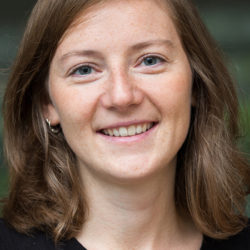
Lea Elsässer is a Postdoctoral Researcher at the Institute for Socioeconomics at the University of Duisburg-Essen. Her research focuses on the relationship between social inequality and political representation, particularly on the consequences of unequal political representation for welfare state restructuring. After receiving a Master of Science in Economics and Sociology from the University of Cologne in 2013, she was a visiting research fellow at the Max Planck Institute for the Study of Societies until 2017, where she wrote her dissertation thesis on unequal political representation in Germany. She held a PhD scholarship from the German Academic Scholarship Foundation for her dissertation studies.
 Timur Ergen
Timur Ergen

Timur Ergen is a senior researcher at the Max Planck Institute for the Study of Societies and an interim professor of sociology at the University of Oldenburg. Timur co-organizes the SASE Research Network Digital Economy and has been a member of SASE’s Executive Council since 2020. His research investigates competition, energy transitions, industrial and technology policy, and the postindustrial economy. His previous work has appeared in Competition and Change, Energy Research and Social Science, the Review of International Political Economy, and the Socio-economic Review.
 Daniel Mertens
Daniel Mertens

Daniel Mertens is Professor of International Political Economy at the University of Osnabrück. Prior to that, he was an assistant professor (Habilitand) at Goethe University Frankfurt and a visiting scholar at Northwestern University. He received his PhD from the Max Planck Institute for the Study of Societies and the University of Cologne. His work ranges from the politics of credit markets and banking to analyses of the modern tax state and has been published in outlets such as the Journal of European Public Policy, New Political Economy, and Socio-Economic Review. He is one of the editors of the International Handbook of Financialization (Routledge 2020).
 Martin Seeliger
Martin Seeliger

Martin Seeliger is Assistant Professor at the Europa Universität Flensburg. He wrote his PhD thesis on European Trade Unionism at the Max Planck Institute for the Study of Societies. After majoring in Social Science at the Ruhr University Bochum, he was a visiting fellow at the Sociology Department of the Universidad Autónoma Metropolitana in Mexico City, the European Trade Union Institute in Brussels, the Stockholm Center for Organizational Research, the Charles and Louise Travers Department of Political Science in Berkeley and the Kolleg Post-Growth Societies in Jena, studying International Labor Relations from a perspective informed by elements from American Pragmatism and Sociological Institutionalism.
In the 1980s and 1990s, both Germany and Japan became emblematic of the concepts of nonliberal capitalism and coordinated market economies. Understood as regimes able to reconcile ‘equity and efficiency’ through a distinct set of institutions, they were put in opposition to the liberal, market-based order of Anglophone economies. Although debates about their resilience against global economic pressures never disappeared, the countries seem to have ceased serving as a unified representation in the study of capitalism(s), particularly since the financial crisis. Since scholarly accounts of both countries’ post-crisis trajectories are dealt with in specialized discourses, this mini-conference seeks to re-connect this research and thereby revive the debate around nonliberal capitalism in and after the age of liberalization. The mini-conference therefore invites both conceptual and empirical contributions that aim to explore, though not exclusively, the following issues:
(1) Developmental trajectories and theoretical approaches: Do the recent trajectories of nonliberal political economies offer opportunities to overthink theoretical approaches in Comparative Political Economy? Do the developments of the last two decades reveal ‘the true faces’ of the German and Japanese systems? How well do both countries align around exports and savings in their ‘growth models’?
(2) Labor and liberalization: Under conditions of progressing liberalization, re-commodification of wage labor has shaped economy and society also under nonliberal capitalism. How can we put these trends into the perspective of long-term trajectories, particularly regarding issues of dualization and inequality?
(3) Changes in the domain of industrial production: The financial crisis, the growth of Chinese manu-facturing exports and the digital economy challenge core parts of the production profiles of advanced nonliberal political economies. How have both countries adapted to recent dynamics in the world economy, for example in the fields of the organization of production, corporate strategies, industrial and innovation policies and state–business relationships?
(4) Financialization, banking and corporate control: Both countries have displayed contradictory and uneven processes of financial liberalization over time. How can we make sense of instances of ‘finan-cial dualization’, and how do they relate to the traditional bank-based characterization of Germany’s and Japan’s financial systems?
(5) Mediating the ‘shotgun marriage’: Under conditions of institutional change within political sys-tems, questions arise about new dynamics of public interest formation in relation to the performance of democracy and the welfare state. How do recent transformations in the domain of party politics and interest representation challenge or sustain features of nonliberal capitalism? And how are Germany and Japan faring in the wave of ‘global Trumpism’?
Socio-Economic Justice, Equality, SDGs and the Constituting of Participatory Society: The Islamic Moral Economy & Finance Project
detailed info Mehmet Asutay
Mehmet Asutay

Mehmet Asutay is a Professor of Middle Eastern & Islamic Political Economy and Finance at the Durham University Business School; is the Director of the Durham Centre in Islamic Economics and Finance; is the Director for MSc in Islamic Finance & MSc in Islamic Finance and Management programmes, and is the Director of the Durham Islamic Finance Summer School.
His research, publication, teaching and supervision of research is all on Islamic moral economy, Islamic banking and finance, Islamic political economy and the Middle Eastern political economies including Turkish and Kurdish political economies. His articles on his research interest have been published in various international academic journals and professional magazines. He has published and edited books on various aspects of Islamic moral economy and Islamic finance, the latest of which are: Islamic Finance: Political Economy, Values and Innovation; Islamic Finance: Performance and Efficiency, and Islamic Finance: Risk, Stability and Growth (these three volume are co-edited with A. Turkistani) published in 2015; Islamic Banking and Financial Crisis: Reputation, Stability and Risks (co-edited with H. Ahmed and R. Wilson) published in 2014; Takaful Investment Portfolios: A Study of the Composition of Takaful Funds in the GCC and Malaysia (co-authored with A. Tolefat) published in 2013.
Mehmet is the Managing Editor of the Review of Islamic Economics; Associate Editor of the American Journal of Islamic Social Sciences; and a member of the Editorial Advisory Board of the International Journal of Islamic and Middle Eastern Finance and Management, Journal of Islamic Accounting and Business Research, and Borsa Istanbul Review. He is also the Honorary Treasurer of BRISMES (British Society for Middle East Studies) and of the IAIE (International Association for Islamic Economics).
 Necati Aydin
Necati Aydin

Dr Necati Aydin is an Associate Professor of Economics at Alfaisal University, Riyadh, Saudi Arabia. He received his bachelor’s degree in public finance, master’s degree in international economics, and two doctoral degrees, one in education and the other in economics. He worked as a researcher at Florida State University and Florida TaxWatch Research Institute and also taught at Florida A&M University and Tallahassee Community College for several years. He had worked at King Saud University for 3.5 years before moving to Alfaisal University in August 2014.
Dr Aydin has conducted research in variety of topics including local and state government budget analysis, economic impact studies, tourism, higher education, virtual education, information technology, and Medicaid. He has published theoretical and empirical papers on these matters. He presents his works through conferences and seminars at top universities around the world including Harvard and Cambridge. In total, Dr Aydin has completed over forty research projects; authored seven, translated two, and co-authored three books; and published many peer-reviewed articles. Dr Aydin currently focuses on Islamic economics, welfare, subjective well-being, institutional economics, and neureconomics. He is currently directing two two-year research projects worth of nearly one million riyals funded by KACST. He also leads three million riyals project on corporate governance index. He has published in top academic journals including Journal of Business Ethics, International Journal of Social Economics, International Journal of Islamic and Middle Eastern Finance and Management etc.
 Shinsuke Nagaoka
Shinsuke Nagaoka

Dr. Shinsuke NAGAOKA is an Associate Professor at the Graduate School of Asian and African Area Studies, Kyoto University, Japan. He has M.A. in Economics from the University of Tokyo (2004), and a Ph.D. in Islamic Area Studies from Kyoto University (2009). He has studied Islamic economics & finance from the interdisciplinary aspects; economics, history and Islamic studies. His major publications are A Study on Islamic Finance in the Modern World (in Japanese, The University of Nagoya Press, 2011) and Islamic Economics and Finance in Action: Inventing a New Universal Paradigm (in English, Brill, 2017, forthcoming).
Islamic moral economy has emerged in the post-colonial period to respond to the observed developmentalist failures including socio-economic failures and the failed political process. As a project, Islamic moral economy aims at human-centred development by essentialising social justice, equality, and participatory and sharing society by rescuing and re-defining human as well as land, labour and capital among all other stakeholders. Thus, Islamic moral economy has theorised an alternative way of re-organising economy, society and politics in an interactive and integrative manner to form a participatory and sharing economy and society.
Within this alternative paradigm, Islamic finance has emerged as the initial operational aspect of Islamic moral economy, which has demonstrated an unprecedented growth in asset size and global expansion. However, despite this phenomenal growth in the transactional nature, we are yet to see the transformational impact of Islamic finance such as on social justice, equality (prevention of inequality and poverty), Sustainable Development Goals (SDGs) as well as constituting participatory and sharing economy.
This mini-conference aims at bringing scholars and practitioners together to discuss the role of Islamic moral economy and Islamic finance in achieving sustainable development, social justice, equality (preventing inequality) and participatory society as well as the political economy impact and consequences of the emerging Islamic finance. The conference solicits conceptual, theoretical, and empirical papers to address the following issues within the Islamic moral economy and Islamic finance frame(s):
- Socio-economic Development and Policy-making within the Islamic Moral Economy Paradigm
- Developing alternative models of Islamic economic development;
- Conceptualising and theorising social and economic justice as well as debate on fairness, equality (inequality) and justice;
- The importance of socio-economic justice and its policy implications;
- Islamic social welfare function and social contract;
- Conceptual and theoretical perspectives on Islamic sustainable development;
- The role of Islamic social institutions for sustainable development;
- Capability approach and social justice within Islamic moral economy;
- Indicators for assessing social economic development in Islamic moral economy;
- Comparative and empirical assessment of socio-economic development, equality/inequality in Muslim countries and Islamic moral economy and finance responses.
- Socio-Economic & SDGs Related Performance of Islamic Finance
- The role of Islamic finance in achieving SDGs; and the impact of SDGs on Islamic finance;
- The role of Islamic social finance on socio-economic justice in overcoming inequality and poverty;
- The environmental impact performance of Islamic finance;
- The role of Islamic finance in ending poverty and reducing inequality;
- The state of CSR in Islamic finance and its impact on financial performance;
- The impact of Shari’ah governance process in essentialising SDGs in Islamic financial institutions.
- Political Economy of Islamic Moral Economy & Finance
- Conceptual and theoretical imaginations of Islamic moral economy on constituting a new political economy and social formation in re-organising society and modes of production leading to participatory and sharing economy, and participatory democracy;
- The role of Islamic political economy and Islamic finance in creating a just and participatory society and sharing economy within the interaction between state, society, individual and firms;
- Locating Islamic moral economy and Islamic finance within counter hegemony, double movement and social movement frames;
- The emergence of Islamic economics and finance through New institutional economics and New Institutional Sociology;
- The impact of politics in the evolvement, expansion and performance of Islamic finance;
- Conceptual and empirical studies on the impact of Islamic finance on political structure and regulation.
State Transformations, Spatial Austerity and the Globalization of Urban Decline: in Search of Alternative Urban Policies (supported by Fondation France-Japon and INCAS)
detailed info Yasushi Asami
Yasushi Asami

Yasushi Asami is Professor at the Department of Urban engineering, University of Tokyo, and Director of its Institute of Innovation in International Engineering Education (IIEE). He holds a Ph.D. in Regional Science from the University of Pennsylvania. His specialization is urban planning, housing policy and spatial information science. His recent research projects include the “management of local government with multi-layered functional areas of social services”, “development of analytical tools of temporal-spatial information”, “influence of physical and social environment to walking behavior” and “vacant houses and social system”.
Recently published:
Shun Kawakubo, Shuzo Murakami, Toshiharu Ikaga, Yasushi Asami (2017) “Sustainability assessment of cities: SDGs and GHG emissions” Building Research & Information, DOI: 10.1080/09613218.2017.1356120.
Masatomo Suzuki and Yasushi Asami (2017) “Tenant Protection, Temporal Vacancy, and Frequent Reconstruction in the Rental Housing Market” Real Estate Economics, Online, DOI: 10.1111/1540-6229.12205
Masahiro Taima, Yasushi Asami, Kimihiro Hino (2017) “The relation between block size and building shape” Environment and Planning B: Urban Analysis and City Science, on line first DOI: 10.1177/2399808317702897
 Sophie Baudet-Michel
Sophie Baudet-Michel

Sophie Baudet-Mochel is a Full-time Lecturer (‘Maître de Conférences’) at Paris 7 Diderot University, where she teaches Geography and Urban Planning. She is a member of Géographie-cités, a research centre dedicated to the study of cities and urban systems, combining theoretical and epistemological approches, qualitative and quantitative methods, and empirical and comparative procedures. She is specialized in analysing the interactions between health, environment and urban dynamics, with a focus on the recent evolution of the spatial distribution of health services in France, in terms of concenration and shrinkage, and inequalities of access to health services.
Recent publications/communications : Explorer la rétraction dans l’espace : les services de soins dans le système urbain français (Exploring the spatialities of urban degrowth : the case of healthcare services in the French urban system), L’espace géographique, 2015 (4), 369-380.
(With Pavard A. and Guérois M.) The dynamic of health care establishment since the late 1990s in France : is there a decrease ? Where ? Can it be explained by demographic evolutions ?, International Medical Geography Symposium 2017, Angers, 3-7 juillet 2017.
 Sophie Buhnik
Sophie Buhnik

Sophie Buhnik is currently a researcher at the French Bureau of the Maison Franco-Japonaise in Tokyo (affiliated with the CNRS and French Ministry of Foreign Affairs) and an Associate researcher at the France-Japan Foundation (EHESS). She holds a PhD in Geography and Urban Planning from Paris 1 « Sorbonne » University. She worked for the DATAR (French Agency for Country Planning and Regional Competitiveness) on plans for the Greater Paris project. In 2012-2013, she was invited to Ritsumeikan University as a fellow of the Japan Society for the Promotion of Science. Her work focuses on issues of access to urban resources in Japan’s shrinking suburbs, at a time when major planning reforms are trying to “right-size” Japanese cities and adapt them to a graying society, but may make them more unequal in the process.
Published in 2017: “The dynamics of urban de-growth in Japanese metropolitan areas: What are the outcomes of urban recentralisation strategies?”, Town Planning Review, 88 (1), pp.79-92.
 Peter Matanle
Peter Matanle

Peter Matanle is Senior Lecturer in Japanese Studies and Director of Research and Innovation at the University of Sheffield’s School of East Asian Studies. Peter’s research interests are in the social and cultural geography of East Asian development. Within this area, his focus has been on: population, environment, and regional development in post-industrial society ; the theory and practice of permanent employment in large organizations ; and representations of gender at work in popular culture.
Recently published : Towards an Asia-Pacific ‘Depopulation Dividend’ in the 21st Century: Regional Growth and Shrinkage in Japan and New Zealand, The Asia-Pacific Journal: Japan Focus, 2017, 15(6).
(Co-Authored with Ishiguro, K. and McCann, L.) Popular Culture and Workplace Gendering Among Varieties of Capitalism : Working Women and their Representation in Japanese Manga, Gender, Work and Organization, 21(5) : 472-489.
Allan Popelard is a qualified teacher (« professeur agrégé ») in Geography. He frequently writes reports for the journal Le Monde diplomatique in France. His research interests cover a wide range of topics related to human geography, politics, economy, society and education, and his fields studies are focused on Post-fordist cities. He currently heads the « L’Ordinaire du capital » (ordinary capitalism) for the Editions Amsterdam (Amsterdam Publishing).
Publications (sélection) : La fin des partis politiques ? (The end of political parties ?). Le Monde diplomatique, April 2017, 13-19.
Détroit, catastrophe du rêve (Detroit, the devastation of a dream). Hérodote, 132,(1), 2009, 202-215.
This mini-conference welcomes contributions that help illuminate current shifts in planning practices and discourses, as well as in local politics under an age of austerity, with a focus on economically depleted cities and regions.
Since the 2000s, scholars working in the fields of planning, urban sociology, or urban political economy in particular, have observed a significant increase in studies about shrinking cities : i.e., formerly thriving cities or densely occupied regions that experience decline of their economic and social bases, with negative effects on their landscapes and prospects for maintenance of infrastructures. Once seemingly confined to industrial cities undergoing shifts from manufacturing to a service-oriented economy, a phenomenon of deprivation seems ever present in non-metropolitan regions that have difficulties to resist to inter-urban competition and the concentration of wealth in a selective network of global cities, in both developed and developing countries. Moreover, the usual symptoms of urban decline (job losses, housing vacancy…) have been strengthened by the enforcement of a neoliberal-oriented rationale among the actors of urban policy making, especially since the Wall Street crash of 2008. According to this rationale, it is necessary, for instance, to respond to market conditions with urban entrepreneurialism, austerity budgeting in the public sector or reduced central-local transfers towards unattractive territories.
In this context, more and more municipalities are trying to replace growth-oriented planning paradigms with ‘rightsizing’, ‘downsizing’ or ‘compact city’ measures, whose main goal is to achieve greater environmental efficiency and social equity by restructuring urban fabrics around mixed-use clusters. However, it seems that actualized rightsizing can produce oucomes that contradict the progressive ideals of rightsizing theories, like disinvestment from poor neighborhoods and attempts at rekindling growth through gentrification. In this respect, is the propagation of ‘rightsizing’ initiatives a way to accommodate and even legitimize an ‘austerity urbanism’ ? Or how can it pave the way to alternative, more progressive urban policies despite regimes of austerity ?
Submitted papers can address, but are not limited to, the following issues :
1/ Analysis of the impacts of austerity urbanism, using quantitative or qualitative datasets. Although critical analyses of the urbanisation of neoliberalism originated in US/UK case-based studies, the urban political economy framework can be applied to explain the effects of State restructurings on countries with diverse planning cultures, such as France or Japan. How does it translate into income disparities at several scales (inter-regional, intra-urban, etc.) or into country-specific distribution of devitalization ?
2/ Interscalar conflicts or arrangements revealed through the application of downsizing projects in declining areas : who are the national or local coalitions behind the enforcement of downsizing principles and what are their objectives ?
3/ Transversal or sectoral approaches to the concrete implementation of downsizing measures in declining areas, like planned demolition/reconstruction in the housing sector. How do we describe the cases where said measures have resulted in greater or – on the contrary – lesser spatial justice ?
4/ The realities of citizen involvement in city downsizing : what is the extent of their participation to greening or equity-oriented initiatives ?
References (selection)
Bernt, M., 2016, “The Limits of Shrinkage: Conceptual Pitfalls and Alternatives in the Discussion of Urban Population Loss” International Journal of Urban and Regional Research 40: 441–450.
Brenner N., 2004, New State Spaces. Urban Governance and the Rescaling of Statehood, Oxford: Oxford University Press.
Buhnik S., 2017, “The dynamics of urban de-growth in Japanese metropolitan areas: What are the outcomes of urban recentralisation strategies ?”, Town Planning Review, 88 (1), pp.79-92.
Edsall, T.B., 2012, The Age of Austerity, New York: Doubleday.
Forrest R. and Hirayama Y., 2009, “The Uneven Impact of Neoliberalism on Housing Opportunities” International Journal of Urban and Regional Research, 33: 998–1013.
Hackworth J., 2015, “Rightsizing as spatial austerity in the American Rust Belt” Environmental and Planning A, 47: 766-782.
Harvey D., 2007, “Neoliberalism as Creative Destruction” The Annals of the American Academy of Political and Social Science 610(1): 21-44.
Hollander J. and Nemeth J., 2011, “The bounds of smart decline: a foudational theory for planning shriking cities” Housing Policy Debate, 21: 349-367.
Hollander J., Pallagst K., Schwarz T. and Popper F., 2009, “Planning shrinking cities” Progress in Planning, 72: 223-232.
Martinez-Fernandez, C., Audirac, I., Fol, S. and Cunningham-Sabot, E., 2012, “Shrinking Cities: Urban Challenges of Globalization” International Journal of Urban and Regional Research, 36: 213–225.
Matanle P., Rausch A.S. and the Shrinking Regions Research Group (eds), 2011, Japan’s Shrinking Regions in the 21st Century : Contemporary Responses to Depopulation and Socioeconomic Decline, NY : Cambria Press.
Morange M. and Fol S., 2014, “City, neoliberalisation and justice”, Spatial Justice 6 [online journal].
Pallagst K., Wiechmann T. and Martinez-Fernandez C. (eds.), 2013, Shrinking Cities: International Perspectives and Policy Implications, New York: Routledge.
Park B.-G., Hill R.C. and Saito A. (eds), 2012, Locating Neoliberalism in East Asia. Neoliberalizing Spaces in Developmental States, Chichester: Wiley Blackwell.
Peck J., 2012, “Austerity urbanism: American economies under extreme economy” City 16: 626-655.
Peck J., Theodore N. and Brenner N., 2013, “Neoliberal Urbanism Redux ? ” International Journal of Urban and Regional Research 37(3): 1091-1099.
Rousseau M., 2014, “Urban redevelopment and social (in)justice: neoliberal stratégies for ‘moving upmarket’ in shrinking cities” Spatial Justice 6 [online journal].
Sorensen A., Okata J. and Fujii S., 2010, “Urban Renaissance as Intensification: Building Regulation and the Rescaling of Place Governance in Tokyo’s High-rise Manshon Boom” Urban Studies 47 (3): 556-583.
Tsukamoto T., 2012, “Neolibralization of the Developmental State: Tokyo’s Bottom-Up Politics and State Rescaling in Japan”, International Journal of Urban and Regional Research 36(1): 71-89.
The Making of Transnational Labor Markets: Reordering of Actors, Institutions, and Policies?
detailed info Ursula Mense-Petermann
Ursula Mense-Petermann

Ursula Mense-Petermann is professor of Economic Sociology and the Sociology of Work at Bielefeld University, Germany. She is one of the organizers of the research group “In Search of the Global Labour Market” at Bielefeld University’s Center of Interdisciplinary Research (ZiF). Within this research group, she is currently conducting a research project on “Eastern European Contracted Workers in the German Meat Industry” and she is guest editor of a special issue of the journal “Global Networks” on “Transnational Labour Markets in the Making – Market Makers, Mobility Regimes, and Regulations” (forthcoming). Earlier research has focused on the transnational mobility of expatriate managers within MNCs: She is co-author of the monograph “Expatriate Managers: The Paradoxes of Living and Working Abroad” (2017: Routledge) and has published several articles on the mobility regime governing the transnational mobility of expatriates.
 Karen Shire
Karen Shire

G: Labor Markets, Education, and Human Resources
Karen Shire holds the Chair in Comparative Sociology and Japanese Society at the University Duisburg-Essen, Germany where she is also a member of the Institute of East Asian Studies and directs the Essener College for Gender Research. She is a member of the faculty of the International Max Planck Research School on the Social and Political Construction of the Economy, and in the past few years has held guest appointments in the research group In Search of Global Labor Markets, at the Center for Interdisciplinary Studies, Bielefeld University, at the Institute for Global Leadership, Ochanomizu Women’s University in Tokyo, and at the Violence and Society Centre, City, University of London. Currently she is Vice-President of RC02 Economy & Society in the International Sociological Association. Her research has contributed to developing inter-regional and historical comparisons of the transformation of work and employment, social institutional changes in the nexus between work and welfare, and changes in class and gender-based social inequalities in Europe and East Asia. Recently her interest has turned to studying the transnationalization of labor markets in the context of migration and global production networks. This research has received funding from the Deutsche Forschungsgemeinschaft(DFG) and the European Commission Anti-Trafficking Coordinator.
A selection of Shire’s latest publications include Transnationalisierung der Arbeit (2018, co-edited with Sigrid Quack, Ingo Schulz-Schaeffer and Anja Weiß, VS Springer), Labour Subcontracting in Cross-Border Labour Markets (2019, with Ines Wagner, in N. Lillie and J. Arnholz Posted Work in the European Union, Routledge), The Social Order of Transnational Migration Markets (2020, in Global Networks) and the forthcoming volume The Dynamics of Welfare Markets: Private Pensions and Domestic/Care Services in Europe (co-edited with Clémence Ledoux and Franca van Hooren, Palgrave). She is a corresponding editor of the International Review of Social History, a member of the editorial boards of Work, Employment and Society, the European Journal of East Asian Studies, and Contemporary Japan, and a member of the Jury for the International Research Prize of Max Weber Foundation.
Shire began presenting her work and organizing panels at SASE Meetings in the 1990s. At the annual meetings in Kyoto she organized the Mini-Conference, The Making of Transnational Labor Markets: Reordering of Actors, Institutions, and Policies? (with Ursula Mense- Petermann), she has served as a reviewer for the SASE Early Career Workshop, and is a rank-and-file member of the SASE Gender Forum. Together with David Marsden, she coordinates the SASE Network G: Labor Markets, Education and Human Resources.
Notwithstanding two decades of intensive economic globalization, the vast majority of labour market research today still applies a national frame of reference, and investigates specific national labour markets. It is, however, questionable if this research focus is able to sufficiently account for current labour related phenomena in a globalizing world. While national labour markets have never been entirely closed, the current period of globalization has led to a situation in which companies seek globally for locations for investment in new production facilities, partly in order to tap into foreign labour forces (mobility of capital). Employees, in turn, may prospect job offers far away from their place of living and their home country (mobility of labour force), on a voluntary basis or on the basis of economic pressures, or even war and violence threatening lives in the case of refugees. These developments also raise questions whether and to which extent the institutions governing the employer-employee relationship have become transnational as well.
This mini-conference, therefore, aims at scrutinizing the complex configuration and inter-relations of the transnational mobility of labour and/or capital, the multi-faceted and multi-layered institutional settings in which these mobilities are embedded, and the different types of (collective) actors that contribute to ‘make’ transnational labour markets. A special focus will be on newly emerging actors, institutions and policies and, thus, on recent processes of reordering the structures of labour markets at a global scale.
The contributions to the mini-conference may address but are not confined to the following questions:
- How do forms of intermediated exchange and organizationally embedded forms of cross-border labour contribute to the social construction of transnational labour markets at various scales of analysis? Here, for example, contributions could focus on the roles of (1) intermediary organizations on external labour markets, such as temporary agencies, trafficking chains, recruitment and brokering agents; (2) MNC-internal labour markets and Global Value Chains; and (3) States and their role in creating transnational labour markets.
- What types of institutions and conventions emerge to govern the coordination problems of placement/matching, valuation and cooperation in transnational labour markets?
- What forms and at what different scales (global, regional, national) can institution-building be observed?
- How are institutional market orders negotiated, and which (collective) actors are engaging in their set-up?
- How do cross-border and transnational networks of labour migrants shape the structures of emerging transnational labour markets?
- Which theoretical categories, methodologies, and empirical methods can be used to investigate transnational labour markets?







